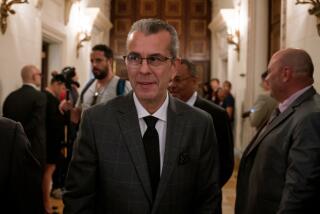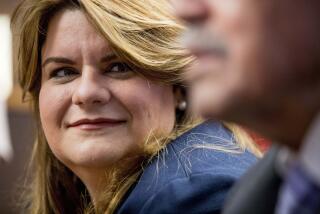A Botched Election
- Share via
Even with the official vote count delayed for suspiciously vague reasons, it is obvious that supporters of Panama’s military strong man, Gen. Manuel Noriega, are determined to keep power in his hands regardless of the results of Sunday’s presidential election there.
Although unexpectedly large numbers of Panamanians came to the polls in the hope of helping to oust supporters of Noriega from the government, Noriega’s forces did all they could to keep opposition ballots from being cast or, when they were cast, to keep them from being counted. In at least two instances, pro-Noriega gunmen stole ballot boxes. More routinely, citizens suspected of being sympathetic to the opposition were turned away from polling places because their names had mysteriously disappeared from registration lists. And there were many reports of uniformed members of the Panama Defense Forces voting several times, presumably casting their ballots on behalf of their commander’s hand-picked candidate, Carlos Duque.
Duque, a business partner of Noriega’s who also had the general’s son-in-law as one of his two vice-presidential running mates (Panama has two vice-presidents), claimed victory shortly after the polls closed Sunday night, even though official election results were not supposed to be available for several days. That caused even the most diplomatic election observers to wonder what was going on. Former U.S. President Jimmy Carter, a member of one foreign observer team, said the voting he watched had been reasonably well run, but “it’s the counting that is the problem.”
Under such dubious circumstances, it is safe to assume that Noriega will have his way and that Panama’s new president will keep him as commander of the 15,000-man defense force. That has always been the chief source of Noriega’s power, despite the fact the vast majority of Panamanians dislike him. If there is one bright spot in the current scenario in Panama, it is that the blatant manner in which Noriega’s supporters conducted themselves during the election could help strengthen the unity of the internal opposition to the strongman.
It also gives the United States, which has been trying to oust Noriega without success, a chance to modify its plan for dealing with a military thug it suspects of drug racketeering. A clearly dishonest election can be used as the basis for rallying international disapproval of Noriega, especially among the many Latin American nations that have been painfully working their way back toward genuine democracy in recent years. Seven of those countries have already excluded Panama from the so-called Group of Eight, the diplomatic coalition working to negotiate peace in Central America. By cooperating with such regional efforts, U.S. officials could come up with new and better ideas for dealing with Noriega.
At the very least, the Bush Administration would be no worse off than it is now--trying to make a failed unilateral policy work. Not only has that policy failed to budge Noriega, it let him pretend to be a nationalist standing up to gringo pressure. A more broadly based campaign to pressure Noriega would show Panamanians that their leader is detested not only in the United States, but all over the world. More important, it would encourage Noriega’s opponents by reassuring them that they are not alone in their efforts to be rid of their brutish strongman.
More to Read
Sign up for Essential California
The most important California stories and recommendations in your inbox every morning.
You may occasionally receive promotional content from the Los Angeles Times.













